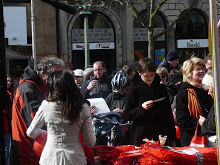
16 April 2007
Globalization + Local = "Glocalization"

"The two basic kinds of social interaction among people"
First: face-to-face contact
Second: more "remote... made possible through transport and communications systems"
The first is found in "premodern societies" where "spatial dimensions of social life are, for most of the population, and in most respects, dominated by 'presence'- by localized activities"
The second, arising from "modernity," "tears the spatial orbit of social life away from the confines of locality, 'fostering relations betwen 'absent' others, locationally distant from any given situation of face-to-face interaction."
"It disembeds or lifts out social relations from local contexts of interaction and rearranges them across extensive spans of time-space. One important effect of this disembedding is to make place, 'which refers to the physical settings of social activity as situated geographically,' increasingly phantasmagoric." (introduction, p.8)
(from Anthony Giddens, 1990, quoted in Inda and rosaldo's The Anthropology of Globalization, 2002)
history I




Everything I might write feels loaded...
Germany was carved up- a border was drawn and, within that border, the West was carved up.
I’ve read the American’s gave the best food rations. But, they were the most blatantly apathetic -the psyche of people who have been through extensive warring on their home turf. I don’t have to be a war veteran to understand that having a war on one’s own land, aggressive attack upon one’s home area (London, Paris, Warsaw, Russian borderlands, and then back to Germany with air raids). I do not mean to downplay the tragedy of Pearl Harbor, but, luckily, we in the US are surrounded so well by oceans and strategically it was more difficult for Japanese to bomb the west coast.
some new thoughts about people in the world

China was a “border” for me...in mind, in body, in conception, assumption, mental strength, endurance.
I can remember so much about my feelings there, just as well as any landmarks.
I had experienced confusion between myself and someone of another race/culture, but not so persistently...
I have seen up close the global inequality that I have been studying...in fact, much of what we have discussed in my classes I have seen already firsthand or surmised it from empirical experience:
uncontrolled markets, the crush of modernity, the pressure in everyone’s life
WHAT is this force that has everyone, from the US to Germany, to China and the Middle East. The inter-connectedness is causing a shared anxiety among peoples about their future, their stakes in their land and government, security (when all is relative and political systems change overnight in Ukraine; new ideologies are popular in South America, ?, and Russia. And China persists with the Communist Party, but very little left of the highly-controlled cultural output. The policing of people’s lives still exists, but people can own property, but they cannot afford to. I cannot write about this. It’s too complicated.
Maybe I always revert to my own feelings because those I can pinpoint with SOME accuracy; they can be triggered and analyzed.
And my interpretation is the only one.
Where are people the happiest? Where are they the most miserable?
21 January 2007
Győr Mediabál

Last Saturday, we attended the Győr Media Ball here. It was at the local university sportsplex, but completely revamped so that it looked like a very large (almost vacuous) ballroom with massive screens, scrims, all types of lighting, and TV screens. It is supposed to be the biggest, fanciest ball in Hungary (so I was told by some, but not the people there.) We were invited by our generous neighbors, Vera and Lászlo, along with his brother and his brother's wife. We sat at round tables with about 10 people each. We were greeted with a glass of sparkling wine, and later served two dishes, but served ourselves at various buffet tables set up around the large space. The Philharmonic, the local Ballet, a "fashion" show (which was, in my opinion, just an excuse to show skin of young women while were acting frivolously competitive with eachother). However, the tall head-dresses were very interesting.
There were TV and media personalities, famous Hungarian musicians, chanteuses, and comedians. It is very exciting to see into a culture as specific as the Hungarian culture and legacy. It's been repressed under different authorities for centuries, and they are very proud to be surviving with their certain Hungarian aesthetic and traditions intact. Their feelings as a nation, I believe, are epitomized by this quote I read during a research session at the Open Society Archives in Budapest. It was quoted by an Eastern German citizen who had written a letter to the West German Radio Free Europe (Berlin, 1962) with the exact same sentiment:
Lajos Koschuth (this writer spelled this family name the German way. It should be Kossuth), a Hungarian freedom fighter from 1848 wrote:
"We have fought, but we were not victorious,
We have struggled and yet we lost,
But when history will write about us
It can be said that we have resisted."
I don't know if, on a night like this one, many of the people would want to hear these words. It's difficult to tell when and if different generations want to feel pride. Because of this supposed "globalized" society, so often it seems that the younger generations do not want to feel a pride in their country's uniqueness. They seem to embrace the global culture (as many argue with much proof) which is dominated by American advertising and product placement. Hungary, on a night like this seems so unique to me. When "Charlie" the famous Hungarian Blues singer croons about lost love and uncertainty of life in his native language, everyone young and old knows the words and get crazy with their enthusiasm, grown men jumping up and down, hugging and kissing other men and women, girls screaming. I was told he had just been in New York City for some performances.
Subscribe to:
Comments (Atom)



